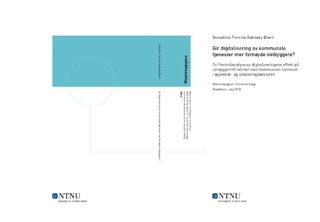Gir digitalisering av kommunale tjenester mer fornøyde innbyggere? En flernivåanalyse av digitaliseringens effekt på innbyggertilfredshet med kommunale tjenester i oppvekst- og utdanningssektoren
Master thesis
Permanent lenke
http://hdl.handle.net/11250/2559447Utgivelsesdato
2018Metadata
Vis full innførselSamlinger
Sammendrag
The development of e-government in Norwegian municipalities brings with it many possibilities, but also challenges. At the same time, Norway is headed towards a service democracy, in which citizens often choose their role as users instead of their role as voters. The objective of this thesis is to examine if e-government in Norwegian municipalities affects citizen satisfaction in the kindergarten and education sector. To investigate this, I performed a multilevel analysis using a citizen survey and surveys on municipal organization and performance. Multilevel analysis allows for the inclusion of level 2 variables in the model as well as cross level-interactions, which is important as my main independent variable is on level 2. The measure of citizen satisfaction is based on questions about the quality of the services in the kindergarten and education sector. Measuring e-government employs an index that accounts for each municipality’s degree of digitalization. The analysis shows that e-government in itself does not affect citizen satisfaction in the kindergarten and education sector. It is important to include cross-level interactions to investigate whether certain groups of citizens had a stronger effect of e-government than others. Another finding is that e-government has positive effects on citizen satisfaction for citizens with a short residency. This also applies for citizens younger than 40 years. These findings indicate that Norway e-government services are more user friendly for some groups of citizens than others. A digital divide like this can weaken our democracy if it prevents certain groups of citizens from participating and performing their duties in society.
